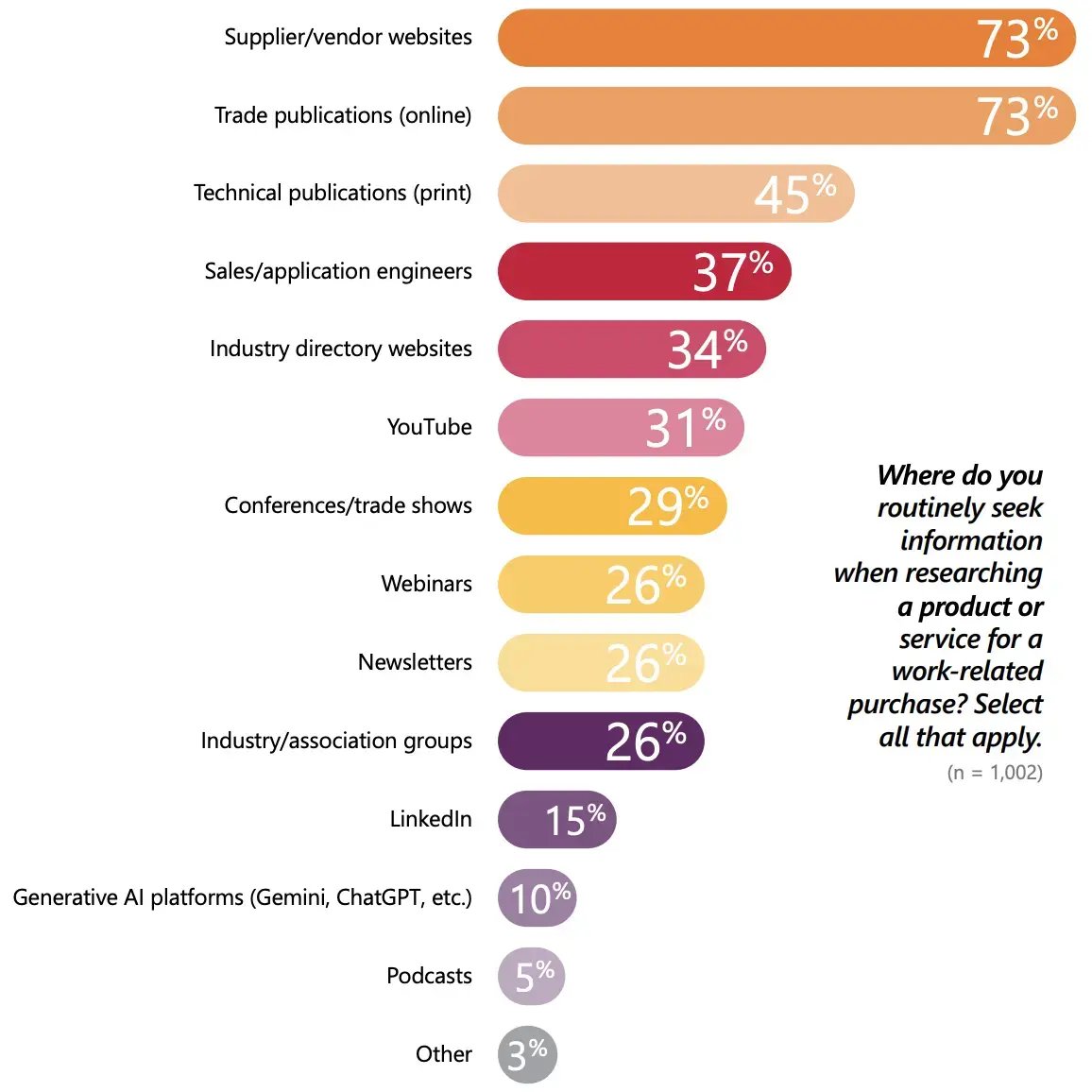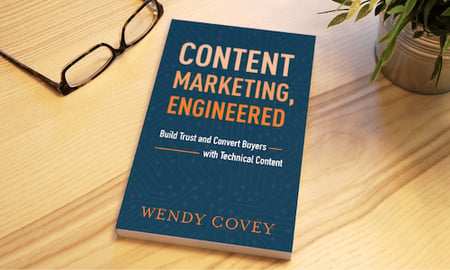Introduction
Welcome to the 2025 State of Marketing to Engineers Report. This marks the eighth consecutive year GlobalSpec and TREW Marketing have partnered to uncover how engineers and technical buyers research, evaluate, and make purchasing decisions in an ever-changing landscape. This year we also collaborated with electronics industry publisher Elektor in order to expand our audience reach and deliver a deeper European perspective to the study.
Our survey blends consistent topics we revisit yearly to monitor key trends with fresh questions designed to explore emerging behaviors. This year’s research dives into trust in generative AI platforms, the ongoing evolution of content preferences, and the role of video and independent sources in purchasing decisions.
Additionally, we take a closer look at how technical buyers are leveraging interactive tools, engaging with newsletters, and balancing in-person events with online research. Whether you’re adapting to AI-driven search trends or refining your content strategy for technical audiences, the insights in this report will help you stand out, drive meaningful engagement, and build trust in 2025 and beyond.
The State of Marketing to Engineers Report is designed to:
- Help you better understand the information needs of technical buyers
- Provide critical insights to guide your marketing plans
- Educate and forge alignment with your leadership and sales organizations
Key Takeaways for Industrial Marketers
- On average, technical buyers spend 60% of the buying process online
- 73% of technical buyers turn to vendor websites and online technical publications for information
- 91% of technical buyers subscribe to newsletters, and 75% of technical buyers are receptive to newsletters with sponsored content
- 58% of technical buyers use generative AI during the purchasing process
- 66% of technical buyers believe that product reviews are most valuable when published by an independent source
- 64% of technical buyers listen to work-related podcasts
- Technical buyers continue to find YouTube, GitHub, and LinkedIn to be the most valuable social media platforms for work
- When it comes to answers from generative AI, technical buyers rank their trust level at 4 out of 10
- 75% of technical buyers plan to attend at least one in-person industry event in 2025
- Technical buyers are almost twice as likely to view a strong website as an indicator of a company’s credibility than a prominent sponsorship at a trade show
Survey Results
Buying Process
On average, technical buyers spend sixty percent of the buying process online. Seventy-two percent spend at least half of the buying process online before choosing to speak to someone at the company.

Thinking back to their most recent work-related purchases, technical buyers were motivated to interact with sales to better understand a complex solution. Pricing and inventory information was also a major factor. Only six percent of respondents said they’d prefer not to interact with a salesperson at all.

Download the full report to learn more about how the buying process is evolving in the age of AI.
Information Sources
Technical buyers routinely turn to supplier/vendor websites and technical publications, both online and print, to find information on products and services.
The top six sources remained the same yearover-year, however online trade publications saw a significant leap in popularity, up thirty-six percentage points from 2024.

Social Media
Similar to years past, YouTube, GitHub, and LinkedIn are considered the most valuable social media platforms for work. X and Facebook experienced signficant drops as valued sources, each falling by more than thirty-five percentage points. Twenty-two percent of technical buyers noted that their company doesn’t allow TikTok.

Video
When it comes to video, seventy percent of technical buyers frequently watch directly on YouTube. Twenty percent interact with video on more than one channel.

Podcasts
Sixty-four percent of technical buyers listen to work-related podcasts, down twenty-six percentage points from 2024. Forty-two percent are subscribed to at least one podcast, however twenty-two percent listen without subscribing.

"64% of respondents listen to work-related podcasts, and they’re a great opportunity for companies and thought leaders to build their brand on different channels. A quick, low-barrier way to explore podcast engagement is to look for existing podcasts where you can be a guest."
-- Wendy Covey, CEO & Co-Founder, TREW Marketing
Events
Seventy-five percent of technical buyers are planning to attend at least one industry event in 2025, and fifty-five percent are planning to attend at least two. This represents a drop from last year’s report in which seventy percent of respondents were planning to attend at least two industry events.

Download the full report to learn more about where technical buyers are searching for information.
Content Preference
As in previous years, datasheets, technical publication articles, and CAD drawings are regarded as highly valuable resources in the purchasing process, as they offer clear and concrete information. Additionally, some technical buyers find demonstrations and reviews helpful for assessing whether product specifications align with their needs.

Technical buyers most value product reviews and product comparisons from independent sources, as opposed to vendor reviews.

Ninety-one percent of technical buyers subscribe to at least one newsletter, while sixty-nine percent subscribe to at least three newsletters.

Regardless of their tendency to seek independent sources, thirty-six percent of technical buyers can appreciate sponsored content in a newsletter if it’s demonstrably relevant to them. Thirty-nine percent are neutral or indifferent to the presence of sponsored content in newsletters.

Technical buyers are more likely to engage with a newsletter featuring sponsored content when the sender shows they’re paying attention. Fifty-seven percent say they would engage for content or resources they found valuable, and thirty-seven percent for trustworthy, relevant sponsors.

"At GlobalSpec, we’ve found that sponsored e-newsletters succeed when they deliver valuable, relevant content and feature trustworthy sponsors. By addressing audience needs and providing actionable insights, marketers can build credibility and drive engagement."
-- Kerry Coppinger, Marketing Director, GlobalSpec
To see how content preferences compare to last year's results, download the full report.
Artificial Intelligence
Most technical buyers don’t consider themselves particularly trusting of generative AI platforms. On a scale from 1 to 10, the average trust level came in at 4.4. This finding hints at a year-over-year trust drop. In 2024, when asked to what extent technical buyers trust answers from AI-based tools on a scale of 1 to 10, the average trust level was 6.5.

Seventy percent of technical buyers rarely or never use generative AI in the purchasing process.

Watch the webinar for a deeper dive into how technical buyers feel about and interact with artificial intelligence.
Brand
When it comes to technical credibility, expertise is everything. Industry- and application-related expertise are considered strong indicators of credibility. When your reputation for customer service and technical support precedes you, that’s a good sign too.

An informative and well-maintained website is the strongest indicator of quality for technical buyers assessing vendors. They also want to know other customers are willing to vouch for you through recommendations and case studies.

For additional insights, including valuable industry perspectives, download the full report.
Watch the Webinar On-Demand
Wendy Covey, CJ Haight, and Udo Bormann share important findings from the research on the content, online search, and buying preferences of engineers and technical buyers.
During the webinar you will uncover new insights about technical buyers, including:
- How the buying process is changing
- Where technical buyers are searching for information
- Which kinds of content they find most valuable for making a buying decision—and how they feel about sponsored content
- Whether they trust AI-based tools
- What boosts a brand's technical credibility in their eyes
Meet the Speakers

Wendy Covey
CEO and Co-Founder
TREW Marketing
Wendy Covey is a CEO, technical marketing leader, author of Content Marketing, Engineered, one of The Wall Street Journal’s 10 Most Innovative Entrepreneurs in America. Over the last 25 years, Wendy and her team at TREW Marketing have helped hundreds of highly technical companies build trust and fill their pipelines through inbound marketing.

CJ Haight
Content Marketing Manager
GlobalSpec
CJ Haight is the Content Marketing Manager at GlobalSpec, where he focuses on creating and improving all customer-facing elements such as collateral, media kits, GlobalSpec’s Marketing Maven blog, social media presence, and websites. He is also a strong brand ambassador, making sure we are presenting our brand identity appropriately.

Udo Bormann
Senior Marketing Manager
Elektor International Media
Udo Bormann, Senior Marketing Manager at Elektor International Media, is an enthusiastic advocate for electronics innovation. With over a decade of professional experience, his expertise lies in crafting innovative marketing campaigns and integrating AI technologies to stay ahead of market trends while elevating the Elektor brand to new heights.
About
About GlobalSpec
GlobalSpec is a provider of data-driven industrial marketing solutions designed to help companies promote their products and grow their businesses.
A robust audience of engineers and technical professionals relies on the GlobalSpec family of brands as a trusted resource for content, community, and engagement at all stages of the research, design, and purchasing process. Clients count on GlobalSpec to deliver deep industry intelligence, customized marketing programs, and measurable campaign performance.
About TREW Marketing
TREW Marketing partners with engineering and highly technical companies to elevate their brand, engage their audiences, and generate new opportunities. Our annual research and decades of experience communicating complex technologies to targeted audiences make TREW a strategic marketing agency partner for companies looking to strengthen their business.
TREW’s strategy-driven marketing services include branding and thought leadership, technical content creation, demand-gen campaigns and sales enablement.
About Elektor
Elektor is a global platform connecting engineers, developers, and electronics industry through expert knowledge, innovation, and hands-on applications. Since 1961, it has evolved from a pioneering magazine into a multimedia powerhouse offering publications, research, e-learning, and e-commerce.
With a strong presence in English, German, Dutch, and French, Elektor bridges the gap between theory and real-world applications. In 2024, it expanded into the European B2B electronics sector by acquiring European Business Press (EBP), strengthening its industry influence.








